The Dark Elves' Fallacy: A Critique of Neoreactionaries
Why the New Lords of Middle-Earth Want to Turn it Into Mordor
"I wish it need not have happened in my time," said Frodo.
"So do I," said Gandalf, "and so do all who live to see such times. But that is not for them to decide. All we have to decide is what to do with the time that is given us."
— J.R.R. Tolkien, The Lord of the Rings
I won’t interrupt your reading with obnoxious buttons. If you’d like to support me, you’ll find options here:
Hey, Slick!
At first, there was only a murmur, a shadow growing in the East. The warnings came, but few listened. Sauron was thought defeated, reduced to a formless presence—a ghost of the past. His fortress lay in ruins, his armies scattered, his ring lost to history. Gondor stood, weakened but intact. The world was not at peace, but it was stable.
But those who understood power—Gandalf, Elrond, even Saruman at first—knew better. His absence was temporary. His influence would return long before his armies. He didn’t need to march on Gondor; he only needed time.
His power didn’t return all at once. It seeped back—piece by piece. The Nazgûl stirred. Spies moved. Corrupt leaders were swayed. By the time Gondor saw the threat, it was too late. The armies were at the gate.
Power doesn’t return with fire and conquest. It seeps in, until what was once unthinkable starts to feel inevitable.
And so it is now.
For years, Neoreaction (NRx) lurked in the background—a fringe ideology muttered in blog posts and backchannels. A loose network of theorists and tech elites, whispering that democracy was a lie and history belonged to the strong. At first, they were easy to ignore; then billionaires started reading, and soon, politicians were listening. The question is no longer if they matter, but how much power they’ve already reclaimed.
Now, Curtis Yarvin meets with power brokers. Peter Thiel funds candidates.
Right-wing elites openly question whether democracy should continue.
Power doesn’t return in a coup. It creeps—until you realize it never truly left. Neoreaction is not coming: it is already here.
And just as in Tolkien’s world, the question before us is not whether we wished it had come in our time—it is what we will do about it.
But if you’re like me, Slick, you may also be pondering another question: How the fuck do people read The Lord of the Rings and side with the Dark Elves, and embrace what Tolkien clearly framed as evil?
Maybe neo-reactionaries are exposing the truth. Or maybe, like Denethor staring into his Palantír, they think they see fate itself—when all they really see is power’s reflection, bending reality to suit its own ends.
I. The Dark Enlightenment: Power, Illusion, and the Red Pill
Neoreactionaries (NRx) do not promise revolution or utopia. Instead, they offer something far more seductive: revelation.
NRx tells you that everything you were taught about power—about democracy, morality, equality—is a lie. The world is not governed by the will of the people but by an entrenched elite, ruling from behind the veil of liberal institutions. Your vote is meaningless. Your ideals are distractions. Politicians, journalists, academics—the entire system functions not to serve the people, but to manipulate them into thinking they have a say.
They call this system the Cathedral.
The Cathedral and the Great Illusion
The Cathedral isn’t a conspiracy—it doesn’t have to be. It’s a self-reinforcing system of universities, media, and cultural gatekeepers. It doesn’t dictate democracy’s rules. It makes them feel inevitable. And for NRx, this is the great crime: not that elites exist, but that they refuse to rule openly and absolutely.
To NRx thinkers, this is the great trick of modernity:
Democracy is not real.
Equality is not real.
There is no “consent of the governed,” only the illusion of it.
And if you can see past this illusion, what do you see?
Hierarchy. Power. The real order of things.
Society is not made up of free individuals making rational choices. It is made up of rulers and subjects, leaders and followers, the competent and the ruled. Some people are fit to govern—and some are not.
And they love The Lord of the Rings—which, ironically, proves a useful guide to understanding them.
Hobbits, Elves, and Dark Elves: the NRx worldview
NRx thinkers love Tolkien’s world, but they do not see it as he intended. They reinterpret it, repurpose it, twist it. In their framing, the world is divided into three types of people:
Hobbits – The masses. Content, docile, uninterested in power. They do not want to rule; they only want to live their comfortable little lives. They may believe in democracy, but they do not truly govern anything. They exist to be managed.
Elves – The ruling elite. The Cathedral. The progressives, the academics, the journalists—those who control culture, politics, and institutions but pretend to do so for the “greater good.” They claim to act in the people's interests while consolidating power for themselves.
Dark Elves – The Neoreactionaries. Those who see through the illusion and understand that power is real, that hierarchy is inevitable, and that those who are fit to rule should do so without deception.
NRx doesn’t see itself as the villain. It sees itself as realist. Hierarchy isn’t evil—it’s inevitable. Power isn’t bad—it’s necessary.
But like Denethor staring into the Palantír, they mistake what they see for the inevitable truth.
II. The Red Pill and the Palantír
Neoreaction does not ask you to build a better world. It asks you to accept the one that already exists—to “wake up” and see that some rule and others obey, and that any system pretending otherwise is a comforting lie. And like Denethor staring into the Palantír, they believe this vision is clarity. But the Palantír does not reveal the future—it reflects the power of those who hold it.
The illusion is comforting, they say. Democracy lets people pretend that they have power when they do not. But if you can look past the illusion, if you can see clearly, then you understand that there is no need for the pretense.
This is the allure of the Palantír.
The Palantír doesn’t lie. It doesn’t have to. It shows you what it shows. And you believe you’re seeing truth—when really, you’re seeing what power wants you to see.
Denethor stares into the Palantír and sees his kingdom’s inevitable decline. He believes he is being pragmatic. He believes he is seeing clearly. He believes there is no other path but surrender.
Saruman stares into the Palantír and sees that Sauron’s victory is inevitable. He believes he is being strategic. He believes there is no real resistance. He believes the only path forward is to serve power rather than be destroyed by it.
Sauron himself sees nothing but power. He believes all beings crave dominion, that all will bend to strength, that there is no good or evil—only those who command, and those who obey.
And in the real world, Palantir Technologies—founded by Peter Thiel, an NRx sympathizer—operates on a similar premise: a tool that promises to reveal hidden truths but ultimately serves those who control it. Like the Palantír of Middle-earth, its power isn’t in revealing everything—it’s in shaping what is seen. And that’s how neoreaction operates. They don’t offer wisdom. They offer certainty, polished to look like truth.
Neoreactionaries, staring into their Palantír, also believe they see the world as it truly is. They believe they are cutting through the illusion. They believe they have abandoned the myths of democracy and justice and replaced them with truth.
But what if they are just another Denethor? Just another Saruman?
Or worse, what if they are another Sauron?
What if they, too, believe they are seeing everything—while missing everything that matters?
A Critique of the “Dark Truth”
If the world is ruled by elites, does that mean all governance should be reduced to the most efficient system of rule?
If power is inevitable, does that mean morality is irrelevant?
If the Cathedral is a lie, does that mean the only alternative is pure, naked authority?
This is the question that NRx does not answer. They claim to see reality, but they do not explain why that reality is worth preserving. They claim to see through the illusions of democracy, but they replace them with another illusion—that power should rule because it is power.
But that is not wisdom. That is not insight. That is simply submission to the strongest will.
This is the trap of the Palantír.
Seeing does not mean understanding.
Knowledge does not mean wisdom.
Power does not mean legitimacy.
Neoreactionaries, like Denethor, believe they are seeing the truth. But their vision is not truth—it is a carefully curated view of history that justifies their own power fantasies. It is not reality—it is a rationalization.
They look into the Palantír and see only control, only domination, only the strong and the weak.
And in doing so, they make the same mistake as Sauron.
III. Sauron’s Efficient Tyranny: Cutting the Knot
Neoreaction claims that once you see reality as it is, governance becomes simple. There is no need for debate, for democracy, for the slow mechanisms of political compromise.
Just install a competent ruler.
Let them run the world like a company.
Abolish the inefficiencies of democracy.
This is the Efficient Tyranny. A world where power is optimized, where the machine runs smoothly, where the future is order.
But order for whom? And at what cost?
The Palantír shows them what they want to see. But what happens when the vision becomes reality?
The Fatalism of the Palantír: The Inevitable Tyranny
Neoreaction (NRx) does not ask you to dream. It does not offer a future to believe in, nor a past to restore. Instead, it offers a choice—one that it claims few are willing to take.
You can continue believing in democracy, in human rights, in the idea that governments serve their people rather than rule them. You can keep telling yourself that votes matter, that history bends toward justice, that equality is possible.
Or, NRx says, you can take the red pill.
The metaphor comes from The Matrix, but in this context, it means rejecting the illusions of liberal democracy. Seeing the world as it really is. Understanding that power is never granted—it is seized. That societies are always ruled by elites, whether openly or in disguise. That “the will of the people” is a convenient fiction, masking the reality of those who truly govern.
And if you take the red pill, NRx tells you, you will understand the great truth:
Democracy is not real.
Equality is not real.
There is no moral arc to history—only power.
History is not a struggle between right and wrong, nor a march toward progress. It is a cycle of power, nothing more, nothing less. Every civilization rises, consolidates, and falls. Every ruling order is eventually replaced. Morality, democracy, human rights—these are just the stories that the powerful tell to justify their rule.
And once you see through those stories, NRx says, you cannot unsee them. They do not dream of a lost golden age, because the past was always ruled by the strong. They do not promise a utopian future, because the future will always be ruled by the strong.
And so, NRx does not propose to resist the tide of history. It proposes to submit to it—to discard the illusions of democracy and replace them with something more honest: a world where power is neither debated nor disguised, but simply accepted as the natural order of things.
Yarvin has a metaphor for this; he calls it the Gordian Knot.
Cutting the Knot: The NRx Case for Tyranny
Alexander the Great, confronted with an impossibly tangled knot, did not waste time trying to untie it. He cut it with his sword.
Yarvin sees the modern state as a Gordian Knot—too tangled to fix, so better to cut it altogether. No debate, no democracy, no slow and inefficient checks and balances, no bureaucratic nonsense or political compromise. Just absolute rule, optimized and unrestricted by the need for public approval.
Yarvin calls this system Neocameralism—government run like a corporation, efficient, decisive, optimized. The country is a company, the people are employees or assets, and the leader is a CEO, answerable only to the success of the system.
Democracy is too slow, too messy, too beholden to mob rule. The answer is autocracy—but optimized.
If you take the red pill, NRx says, you will see the world as it really is: a world where power is absolute, where rulers rule and the ruled obey, where democracy is a distraction, and justice is a myth.
And if you accept this, what is left?
You do not try to fix the world—you accept that it was never broken. You do not fight for something better—you embrace reality as it is. You do not untangle the complexities of governance—you cut the knot and let the strong take their rightful place.
But this kind of certainty is not clarity. It is fatalism.
Neoreaction claims to be an act of seeing through illusion. But seeing is not the same as understanding.
This is the lesson of the Palantír.
The Palantír as Fatalism: Seeing, But Not Understanding
The Palantír doesn’t lie—it just doesn’t show the full picture. Like NRx, it reveals what power wants you to believe.
Denethor sees ruin and gives up. Saruman sees power and submits. Sauron sees only dominion—blind to the truth that power isn’t everything.
Neoreactionaries, staring into their own Palantír, believe they are seeing the world as it truly is. They see democracy as a façade, hierarchy as inevitable, and governance as an engineering problem, not a moral dilemma. And like Denethor, Saruman, and Sauron, they believe this is the full picture.
But is it?
The NRx Misreading of Power
NRx prides itself on cold realism. It rejects sentimentality, rejects morality, rejects what it sees as weakness. It claims to have stripped away the comforting myths of democracy and progress, leaving only the hard machinery of power.
But their vision is not realism—it is fatalism.
Like Denethor, they look into their Palantír and see only decline.
Like Saruman, they look into their Palantír and see only submission to power.
Like Sauron, they look into their Palantír and see only dominion, nothing else.
But power is not just control.
Power is not just force.
Power is not just a system to be optimized.
And the moment you believe it is, you become trapped.
The Trap of Efficiency Without Legitimacy
Neoreaction claims that if government is just a machine, it should run like one. But if power is purely mechanical, who is the machine serving?
A company has a CEO, but they are accountable to a board. A country has a ruler—but if leadership is absolute and modeled after corporate efficiency, who holds them accountable? If there is no democratic check, no popular legitimacy, and no independent oversight, what stops the ruler from running the world for their own benefit, with no real constraints?
History doesn’t show absolute rulers acting in the people’s interest. It shows them fortifying—hoarding power, hoarding privilege, hoarding control.
“Power tends to corrupt and absolute power corrupts absolutely.”
-Lord Acton
Neoreaction has no answer for this because it does not see it as a problem. A ruler is strong, or they are overthrown. Stability is the only metric that matters.
But stability for whom? Stability for the elites who rule? Stability for the subjects who have no say? Stability as in no more chaos, no more rebellion, no more voices calling for change?
A world of order—but what kind of order?
NRx stares into the Palantír and sees a future without democracy, without disorder, without inefficiency. But what they do not see is a world worth living in.
The Dark Elves’ Dilemma: Who Rises, Who Serves?
NRx doesn’t just believe in rulers and ruled—it believes in a permanent ruling class. But who gets to be an Elf? And once they are on top, what stops them from staying there forever?
They believe the system should be optimized for rule.
But what happens when you optimize for obedience? What happens when you seal the social order and tell everyone that where they are is where they must stay? What happens when you turn humans into orcs?
In The Lord of the Rings, Sauron’s ultimate creation is not an empire of perfect rulers. It is an empire of perfect subjects.
NRx claims to reject illusion—but what if their own illusion is that they will always be the ones on top?
IV. The Order They Want: Who Gets to Be an Elf?
Neoreactionaries believe they are realists.
They claim that every society has rulers and ruled, that power is not something evenly distributed, and that democracy is a trick played on the masses to keep them pacified.
They do not call for a return to hereditary monarchy or the divine right of kings; instead, they say, rule should be based on competence. The strongest, the smartest, the most capable should lead, unshackled by the illusions of democracy or the inefficiencies of political compromise.
But who decides who is worthy to rule?
Elves, Dark Elves, and the Hobbits Below
NRx envisions the world as a natural hierarchy, and their Lord of the Rings metaphors are telling: Hobbits obey, Elves manipulate, Dark Elves understand.
They see themselves as the dark mirror of the Cathedral—not pretending to act in the people’s interest, but openly pursuing power as a discipline of efficiency and strength.
They claim they are not like the Cathedral Elves, who rule under the pretense of democracy and equality. They claim they are not like the Hobbits, who live in ignorance. They claim they are the ones who should govern openly, without pretense.
But the fundamental question remains: Who gets to be an Elf (or a Dark Elf)?
Because in a world ruled by power, what happens when you are no longer powerful?
The Lie of Meritocracy: Who Decides the Ruler?
Neoreaction insists that power should not be inherited, nor granted by popular vote, but earned. The leader should be like a CEO—chosen for competence, efficiency, and results. And, just like in business, if the leader fails, they are replaced.
This sounds like meritocracy… But who decides who gets the job? Who appoints the ruler? Who defines "competence"? And once in power, what stops them from entrenching themselves?
NRx assumes a ruling class will naturally form. But history shows that once elites take power, they do not remain in place because they are the best rulers. They remain because they control the ladder itself—pulling it up behind them and sealing the doors shut.
The problem with absolute power is not just who gets it—but how it is passed on.
Neoreaction does not create an efficient ruling order.
It creates a new aristocracy—one that is self-justified, rather than accountable.
And once rulers are installed with no challenge to their authority, what stops them from ensuring only their kind stay on top?
This is not a system of continuous merit—it is a system of consolidated power.
The Broken Elevator: What Happens When the Doors Close?
NRx justifies its hierarchy by pretending it is meritocratic.
They say: "Power will go to the best and most competent."
But once the hierarchy is established, who gets to move up? Who gets to join the ruling class? Who has the right to challenge the system?
If power is absolute, what prevents rulers from choosing only their own heirs and allies?
If rulers are beyond question, what stops them from creating a system that serves only their interests?
NRx never answers this.
Because they do not believe in change. Once they are in power, they expect to remain there.
The elevator to power is broken. No mobility, no challenge to the system, no way for power to adjust when it fails.
What starts as an efficient system of rule becomes a frozen hierarchy. At first, NRx sees itself as the ascendant class—but what happens when the door closes behind them?
When rulers stop being accountable, they stop being competent. And when power locks into place, it exists only to protect itself.
This is not an optimized system—this is just another aristocracy.
And every aristocracy eventually crumbles under its own weight.
The Illusion of Stability: Why It Always Fails
Neoreaction dreams of a world of stable rule. No more democracy, no more protests, no more slow decision-making; just a world where order is established and never challenged.
But this is not a real solution.
This is the dream of every elite class throughout history.
The kings of old believed they were divinely chosen.
The feudal lords believed they were the natural rulers of men.
The elites of every era have told themselves they are the rightful governors.

And what happened to them?
They fell.
Because no ruling class ever remains in power forever.
Because a system that does not allow challenges eventually collapses from stagnation.
Because when people are locked into roles, they do not accept their fate forever.
NRx does not create a utopia of perfect rulers, they create a world of people who cannot escape their station.
And that is not a world of order—that is a world waiting to break.
V. The Fate of the Ruled: From Hobbits to Orcs
NRx assumes most people do not seek power. That they will accept order, as long as it is competent. But when choice is stripped away, when every path upward is closed, when obedience is no longer asked but demanded… people do not stay passive. They do not become ideal subjects, they become something else—and every system that locks people into submission finds out, eventually, what that something is. And history has seen what happens when the ruled, beaten down, begin to see the system itself as their enemy.
The Hobbits of the world are content, uninterested in ruling, and prefer stability over chaos. Give them order, give them a strong ruler, and they will accept their place.
Democracy, protests, and political debate only confuse them—what they need is a well-run system that removes their burdens and manages them efficiently.
This is the NRx vision: the elites govern, the masses accept their place. Society is stable, optimized, efficient.
But this assumption is wrong.
Because when people are stripped of choice, they do not stay content Hobbits.
They become something else entirely.
And history shows what happens when a system is built on total control.
You do not get a nation of loyal, peaceful subjects; you get a nation of Orcs.
The Making of an Orc: What Happens When You Optimize for Control?
Sauron did not create a world of loyal subjects. He created a world of slaves.
He did not rule over independent beings, but over those who had been broken.
He did not command respect, but obedience.
His armies did not fight out of loyalty, but because they had no choice.
The Orcs were once Elves. Creatures of light, twisted into something dark.
Creatures of free will, reduced to pure submission.
Creatures who might have built great things, now used only for war, labor, and servitude.
This is what happens when a system optimizes for control instead of growth. It does not produce a stable, thriving society. It does not create strong, loyal subjects. It creates people who have been stripped of everything—until they no longer care.
NRx assumes people accept order as long as it is efficient. But strip away agency, and they don’t stay content Hobbits… They become something else.
Sauron’s Orcs weren’t loyal. They were slaves. And when he fell, they didn’t fight for him: they scattered.
This is the real flaw of the NRx worldview. It is not creating order; it is creating something that cannot last.
Mordor as the NRx Endgame: Control, but at What Cost?
Sauron had total control over his empire. His armies obeyed without question, his workers labored without rebellion, and his hierarchy was absolute, rigid, and unchallenged.
By Neoreactionary logic, this should have been an unshakable empire.
No democracy!
No disorder!
No inefficiency!
And yet… it fell.
Because a system based on control alone does not create loyalty—it creates resentment. A system that suppresses all challenge does not make itself stronger—it makes itself blind to its own weakness. A world optimized for obedience does not build something great—it only ensures that no one fights for it when the time comes.
Mordor did not fall because of a superior army.
It did not fall because of open rebellion.
It fell because, at its core, it was a machine that had no real strength—only fear.
And a system ruled by fear is always waiting to collapse.
NRx claims to create stability. But what they are really creating is a prison—one where obedience is expected, not earned. One where rebellion is not an aberration, but an inevitability. Because no system that seals people into roles forever can hold. No empire of pure control has ever lasted. And when it falls, it does not erode—it shatters. Even Mordor, built on fear, was not immune to collapse. Because the greatest weakness of tyranny is that it expects to rule the future—while democracy, for all its chaos, adapts to it.
A prison where people do not feel part of their own society.
A prison where people obey only because they are forced to.
A prison where the only way out is to destroy the system entirely.
And history shows, again and again, that is exactly what happens.
The system does not last. It only ensures that when it falls, it falls hard.
The Trap of Total Rule: The System Cannot Adapt
NRx believes that their strong, stable hierarchy will last.
But no system lasts when it cannot adapt.
A society that does not allow challenge does not fix its problems.
A system that locks people into permanent classes does not allow new ideas to rise.
A world that relies on suppression never wins loyalty—it only builds resentment.
And when that resentment reaches a breaking point?
The ruled do not defend the system—they burn it.
The masses do not stay Hobbits—they become something else.
The rulers, confident in their absolute power, find that the world has turned against them.
Because when you optimize for obedience, you do not get a society of willing subjects. You get a cage full of prisoners, waiting for the bars to break.
VI. The Broken Elevator: Why This System Always Fails
Neoreaction presents itself as a meritocracy: a system where the best rulers rise to power; where competence, not popularity, determines leadership; where rule is optimized, stable, and free from the inefficiencies of democracy.
But once their system is in place, what happens next?
Who decides when a ruler has failed?
Who chooses the next leader?
Who prevents power from becoming hereditary?
Because if there is no democratic check, no popular legitimacy, and no mechanism for challenge, then the only way power changes hands is through force, betrayal, or collapse.
What NRx does not admit is that once a ruling class takes control, it does not voluntarily step aside. And in a world where power is absolute, it does not select for competence—it selects for self-preservation.
The Illusion of Meritocracy: What Happens When Power Settles?
NRx sells itself as a system where the most competent rule.
But once a ruler is installed, what ensures they remain competent?
In a corporation, a failing CEO can be fired.
In a monarchy, a weak king can be overthrown.
In a democracy, leaders must earn legitimacy from the people.
But in a Neocameralist state, who holds the ruler accountable?
NRx claims that rulers will be replaced if they fail. But who decides failure?
If the Palantír only shows what power wants it to show, how can the ruled ever know when the system is broken? If the elevator only ascends, who ensures it doesn’t become a sealed tower?
If the ruler controls all media, how do people know they are failing?
If the ruler controls all institutions, who removes them?
If the ruler controls the military, what prevents them from staying in power indefinitely?
NRx assumes absolute rulers will act in the best interests of the system. But history does not support this.
Absolute rulers do not self-correct—they rewrite the rules to keep themselves in power.
Systems that concentrate power do not elevate the best—they entrench those who are already in control.
Once an elite class is installed, they have no incentive to allow new elites to emerge.
NRx claims to create a system of competence. But what they actually create is a system of stagnation.
And once that system locks into place, the elevator to power is broken.
The Illusion of Power: They Think They Will Always Be on Top
Neoreaction doesn’t just believe in hierarchy—it believes it will always rule. They assume they will be the ones making decisions, and never be on the other side of their own system.
But history does not work that way. Even the most entrenched elites fall; even the most absolute rulers lose control.
And when that day comes?
The system they built to keep others down will be used to keep them down.
The tools of control they wielded against the weak will be turned against them.
The frozen hierarchy they thought eternal will become their own prison.
They will look up at a world where rebellion, mobility, and escape are no longer possible. A world where the next ruling class has no need for them.
And when they try to fight back?
They will find themselves trapped in the world they created...
And there will be no elevator left for them to climb.
History is a Graveyard of Frozen Hierarchies
Every ruling class that tried to freeze power thought they had built something eternal.
And every single one fell. Every single one, Slick.
Tsarist Russia? The Romanovs ignored social change and crushed reform. When their system cracked, they weren’t just overthrown—they were exterminated.
The Late Roman Empire? Rome’s elite insulated itself from reality. As corruption spread and crises mounted, it could no longer adapt. It collapsed.
Sparta? A rigid warrior elite ruled over an enslaved underclass. The system seemed unshakable—until constant repression bred constant rebellion. When the outside world changed, Sparta couldn’t. It fell.
The Ottoman Janissaries? Originally elite warriors, they entrenched themselves, resisted reform, and blocked modernization. The state they once controlled dismantled them.
The French Aristocracy Before the Revolution? Hoarding power, dismissing unrest, believing themselves untouchable—the result? The guillotine.
The Soviet Union? Built on absolute control, it crushed dissent and innovation until the system collapsed under its own weight.
The Qing Dynasty? Convinced their empire was eternal, they resisted reform and locked power into a rigid hierarchy. When crises came, the system was too slow, too corrupt, and too fragile to adapt. The dynasty fell.
Mordor? (Yes, even in fiction, this is the pattern.) – Sauron’s empire was not built on strength, but on control. His hierarchy was absolute. His subjects had no loyalty, only fear. He believed his dominance was inevitable—until it wasn’t. When the cracks appeared, his system crumbled in an instant.
The pattern is always the same: a ruling class believes it has secured power forever. It stops evolving, stops adapting, stops improving. It believes it is stable.
Until, one day, it isn’t.
And when the fall comes?
It is not a smooth transition. It is not an orderly reform. It is collapse, revolution, and ruin.
Neoreactionaries think their system will be the exception…
But history does not work that way. Once power stops circulating, it stagnates.
And once it stagnates, it is already dead.
VII. The Choice We Have: Cutting the Knot vs. Understanding the Tapestry
Neoreactionaries claim to see through illusions.
They believe that history is not a battle of ideals, but a machine of power.
That society is not a web of relationships, but a system to be optimized.
That politics is not about negotiation, but about control.
And most of all, that complexity is the problem. Democracy is too slow, debate is too inefficient, negotiation is too messy.
Their answer? Cut the knot.
Like Alexander before the Gordian Knot, they do not see the value in untangling complexity. They see a tangle of inefficiencies, of contradictions, of wasted motion—and they believe the solution is to slice through it with raw, efficient rule.
But what they call a “knot” is not just inefficiency—it is the fabric of human society itself.
And cutting through it is not wisdom—it is a failure to understand what is being cut.
Why Complexity Exists: The Tapestry of Human Society
Democracy is messy. Culture is messy. History is messy.
Not because people are incompetent, but because people are different.
They disagree, they struggle, they dream of different futures.
And yet, from this conflict, this tension, this disorder—something emerges. New ideas, new coalitions, new solutions.
Society is not a machine to be optimized; it is a living system.
And the very conflicts that NRx sees as “inefficiencies” are what make societies adaptive, resilient, and capable of change.
A world without debate, without friction, without struggle is not a world that runs smoothly; it is a world that stops evolving.
Because a system that cuts away conflict, cuts away debate, cuts away disorder, does not create a stable society.
It creates a dead one.
Cutting the Knot is the Easy Answer—But the Wrong One
Every dictator, every autocrat, every ruler who promised to "fix" society did so by cutting through its complexity.
Every failed empire, every collapsed state, every stagnating regime believed that "efficiency" was more important than participation.
Every system that optimized for order above all else—ended not in order, but in collapse.
Because a society that suppresses challenge, suppresses debate, suppresses the friction of difference, does not make itself stronger. It makes itself brittle.
NRx looks at history and believes it sees the truth of power. But what it does not see is that power does not thrive on rigidity—it thrives on adaptability.
The reason democracy, debate, and participation persist is not because they are idealistic illusions. It is because they are antifragile.
They are messy, inefficient, frustrating—
But they create systems that can change, adjust, evolve.
And that is why they survive.
NRx does not solve the problem of governance.
It eliminates its ability to evolve.
And in doing so, it dooms itself to eventual failure.
The Alternative: Understanding the Tapestry Instead of Cutting the Knot
The choice before us is not between "tyranny or chaos". That is a false binary.
We do not need to accept a broken system just to avoid dictatorship.
We do not need to choose between "The Cathedral" and "The Strongman."
We do not need to surrender to fatalism, as if history is a machine grinding toward inevitable conclusions.
History is not a machine.
It is a story.
One that is written by human beings.
One that is never finished.
One that has room for struggle, for reinvention, for possibility.
NRx believes that power should be optimized, that society should be engineered.
But societies are not machines—they are woven together, through history, culture, conflict, and connection.
If a machine breaks, you discard it.
If a tapestry frays, you repair it.
The answer to a complex, messy world is not to "fix" it by making it rigid.
It is to understand it, navigate it, and ensure that it remains dynamic.
That is how societies endure.
Not by cutting the knot, but by learning to live with its complexity.
And that is what NRx will never understand.
Because their vision is not one of governance.
It is one of control.
And control is always temporary.
Where This Leads: The Choice We Make
We can look at history and see a cycle of hierarchies rising and falling, and assume that this is all there is.
Or we can see a different story.
A story where power is not a prize to be hoarded, but a responsibility to be shared.
A story where societies succeed not when they suppress disorder, but when they learn to harness it.
A story where the future is not determined by those who claim to see it most clearly—but by those willing to shape it together.
NRx wants you to believe history is inevitable.
That the strong will always rule.
That power is all that matters.
But history is not inevitable.
History is made.
And the only question left is: Who will make it?
If NRx misreads history, they also misread Tolkien. Because the story they think they are telling—the triumph of the strong over the weak—is not the story that actually unfolds in Middle-earth.
Can they even read?
VIII. How The Lord of the Rings Actually Ends – The Real Lesson About Power
Neoreactionaries look at The Lord of the Rings and see a world of hierarchy, power, and order. They see a realm divided between rulers and subjects, between those who command and those who obey. They see a story about strong, competent elites saving a world too weak to save itself.
But this is not the story Tolkien wrote.
Because when the final battle comes, it is not the wise Elves, the noble kings, or the great warriors who defeat Sauron.
It is the small ones.
The unexpected ones.
The ones who should never have mattered.
It is the Hobbits.
The Ring is Not Seized—It is Destroyed
Neoreactionaries believe in power.
They believe it is the ultimate force in history.
They believe that control is both inevitable and desirable.
But the defining moment of The Lord of the Rings is not power being wielded correctly.
It is power being rejected.
Aragorn does not claim the Ring and use it to secure his reign.
Gandalf does not seize it to bring “benevolent” rule to Middle-earth.
The Fellowship does not find a way to control it for the greater good.
They do not harness power.
They unmake it.
Because Tolkien understood something NRx will never accept:
The desire to rule—even for good—inevitably corrupts.
The Ring cannot be used wisely—it can only be destroyed.
Power does not belong to one, nor should it.
And when the moment comes, it is not an army that defeats Sauron.
It is not a king.
It is not an empire.
It is two Hobbits, alone in the heart of Mordor.
Because the greatest power in the world is not in the hands of those who seek to rule.
It is in those who refuse to be ruled.
The Dark Elves Are Not the Heroes
Neoreactionaries see themselves as the Dark Elves—the ones who understand power, who see through illusion, who know that rule is inevitable and that those who are fit to rule should do so without deception.
They believe that history belongs to the strong.
That stability is built through submission.
That hierarchy is the natural order of things.
But The Lord of the Rings does not reward those who seek control.
It does not frame the world as rulers and subjects.
It does not glorify those who impose order.
It tells a different story.
Because the ones who actually shape the fate of Middle-earth are not its strongest warriors or its oldest kings.
They are Frodo and Sam, the overlooked and underestimated.
They are Merry and Pippin, dismissed as foolish and irrelevant.
They are the ones who were never meant to matter.
And when the dust settles, who is left?
Not Sauron.
Not Saruman.
Not the armies that sought dominion.
The world is rebuilt not by a conquering force, but by those who resisted control in all its forms.
NRx believes in an eternal struggle for power.
But Tolkien’s world shows something else entirely.
That true strength is not in ruling—it is in refusing to be ruled.
The Fellowship: The Alternative They Cannot Accept
NRx sees the world as a game of power.
They believe society must be ruled from above.
That the only way to create order is to impose it.
That history moves forward when the strong shape it.
But Tolkien’s story presents a different vision.
The Fellowship is not an empire.
It is not a ruling class.
It is not a hierarchy of absolute command.
It is a coalition.
Aragorn, the rightful king, does not demand obedience—he earns trust.
Gandalf, the wisest among them, does not rule—he guides.
Legolas and Gimli, from rival peoples, do not seek dominion—they seek understanding.
The Fellowship does not succeed through domination.
It succeeds through cooperation.
And this is what NRx cannot understand.
They see all power as coercion, all governance as control, all authority as something to be seized.
But The Lord of the Rings shows that power need not be hoarded.
That leadership is strongest when shared.
That the world is not just rulers and ruled.
It is Fellowship.
The Real Lesson of The Lord of the Rings
Neoreactionaries look into the Palantír and see only power.
They see a world where rulers must be strong, where hierarchy is inevitable, where control is necessary.
They see a world where the only choice is between domination and submission.
But they do not see the whole picture.
They do not see that the greatest power in Middle-earth was not strength, but defiance.
They do not see that Sauron fell not because he was outmatched, but because he was outmaneuvered.
They do not see that the strongest rulers in the story were not those who commanded, but those who let others govern themselves.
The lesson of The Lord of the Rings is not that power should be concentrated in the right hands.
It is that power must always be resisted, decentralized, and shared.
And that is why, in the end:
The ring is not used.
The ring is not wielded.
The ring is destroyed.
Because the true battle is not between rulers—it is between those who believe in absolute power and those who refuse to submit to it.
And history?
History belongs to those who resist.
IX. Conclusion: The Story That NRx Cannot Tell
Neoreactionaries claim they see through illusions.
They claim they are realists, that history is nothing but a cycle of strong rulers crushing the weak.
They claim they are building a system that will endure.
But history does not belong to those who hoard power.
It belongs to those who challenge it.
Power is not eternal.
Hierarchies do not last forever.
The future is not written by those who assume they will rule forever—but by those who refuse to be ruled.
NRx thinks history belongs to those who seize power. But history is written by those who refuse it. And the only question left is: who will write the next chapter?
Because history is not a machine running on predetermined tracks. It is a field of infinite paths, some leading to tyranny, others to renewal. And the only real choice is whether to see the world as a Palantír does—a cold, fatalistic march toward power—or as the Fellowship does: a web of alliances, built not on domination, but on trust, defiance, and the belief that even the smallest among us can change the course of the future.
And the lesson of The Lord of the Rings is clear:
The ones who seem weak matter more than anyone expects.
The ones who seem powerful fall faster than they realize.
And in the end, it is not those who seize power that shape history—it is those who refuse to bow to it.
Neoreaction looks at Middle-earth and sees a world where rulers must impose order.
But Tolkien’s story was about something else entirely.
It was about the power of those who say no.
And that is a power no ruler can ever truly defeat.
Tolkien opened this road for us, Slick—so let’s let him have the last word. Because when it comes to power, order, and the choices we make, he left us with this:
”Faithless is he that says farewell when the road darkens.”
“War must be, while we defend our lives against a destroyer who would devour all; but I do not love the bright sword for its sharpness, nor the arrow for its swiftness, nor the warrior for his glory. I love only that which they defend.”
And now, Slick, we make our stand. Let this be the hour when we draw swords together. Fell deeds awake. Now for wrath, now for ruin, and the red dawn.







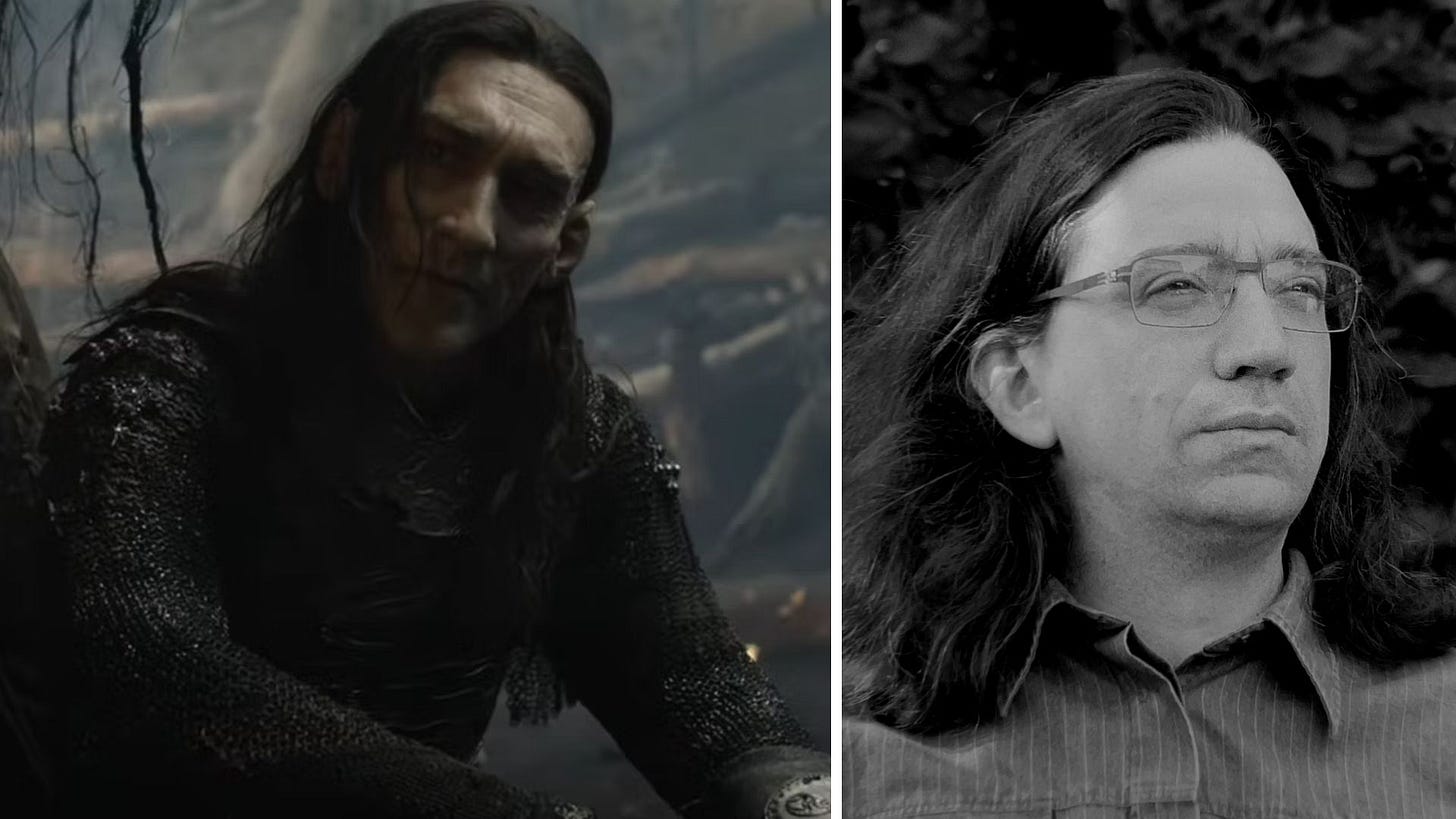
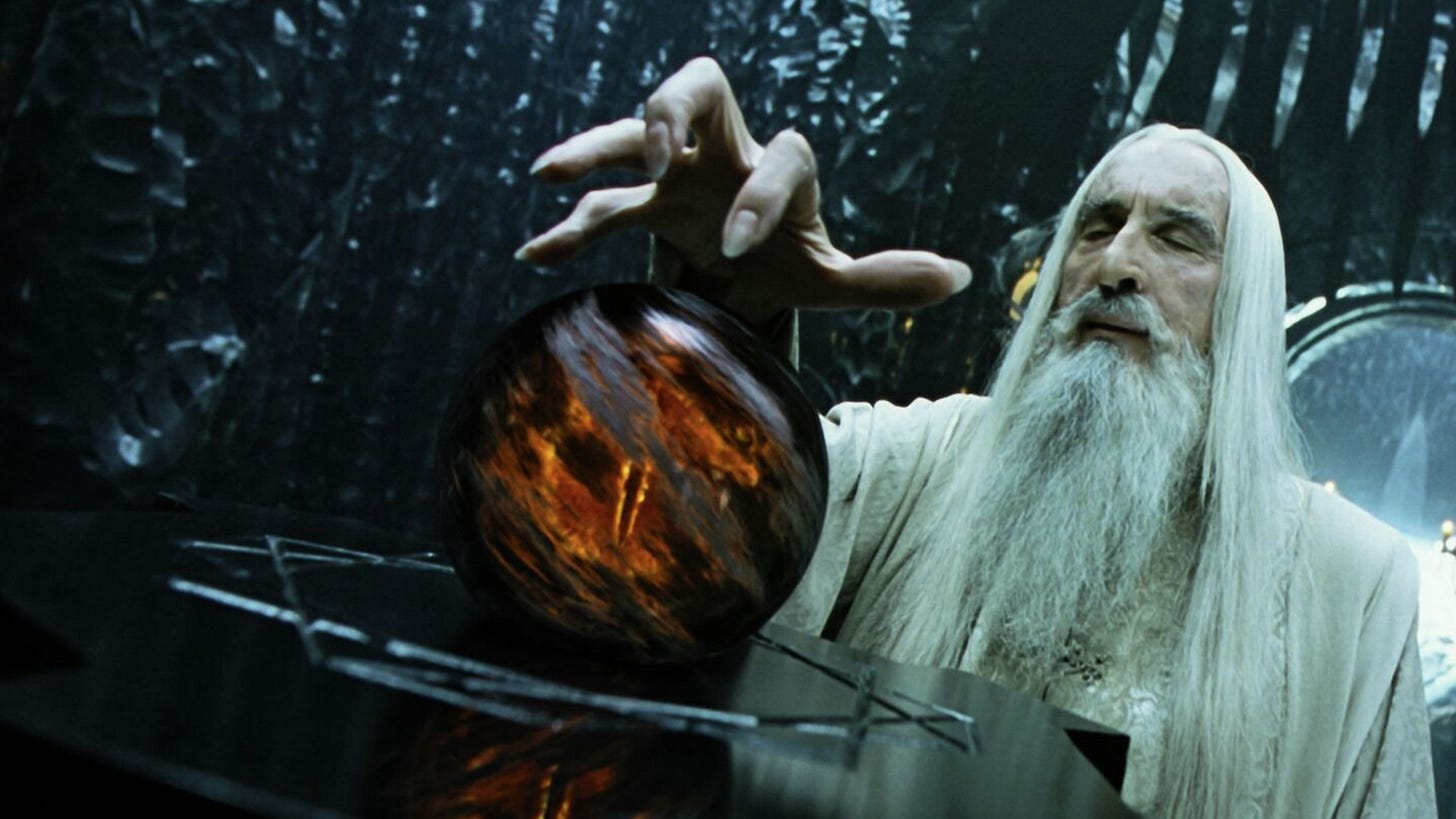

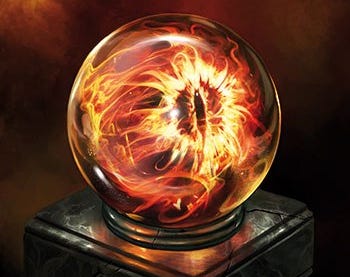
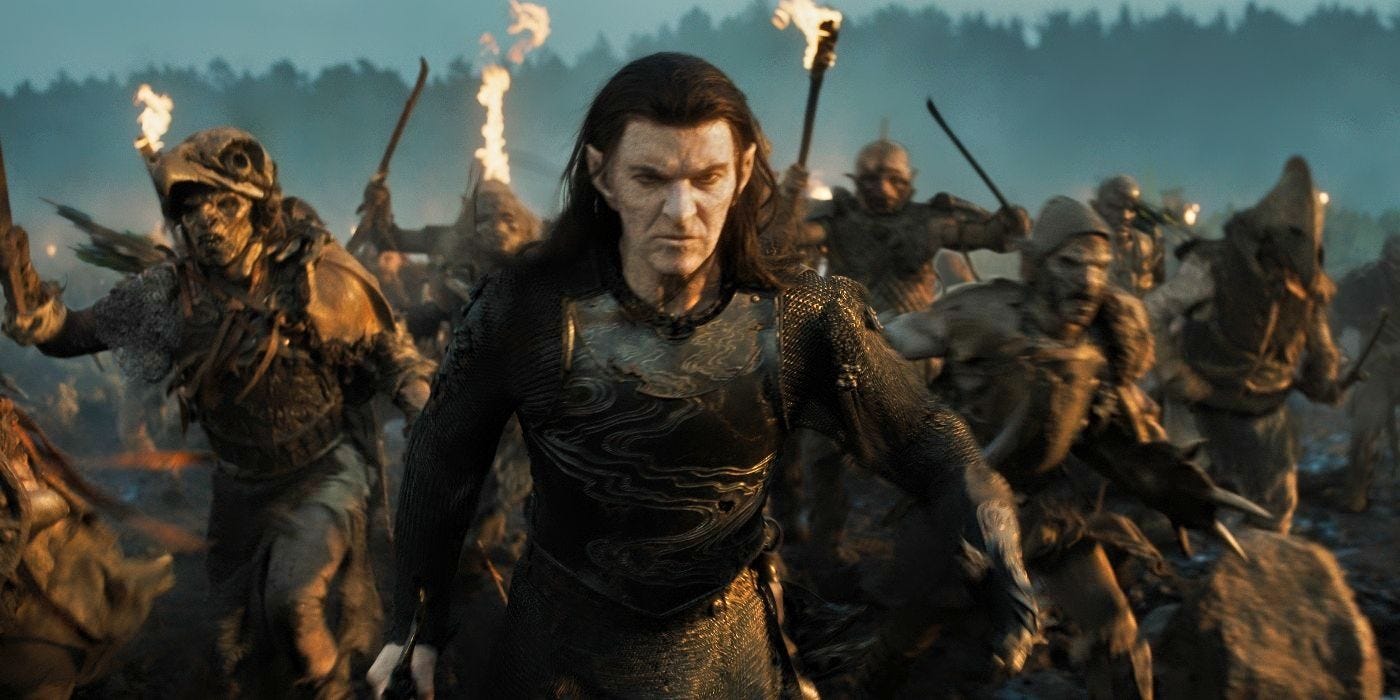
![ؘ on X: "j.r.r. tolkien about orcs: “for the orcs had life and multiplied after the manner of the children of Ilúvatar. [...] and deep in their dark hearts the orcs loathed ؘ on X: "j.r.r. tolkien about orcs: “for the orcs had life and multiplied after the manner of the children of Ilúvatar. [...] and deep in their dark hearts the orcs loathed](https://substackcdn.com/image/fetch/w_1456,c_limit,f_auto,q_auto:good,fl_progressive:steep/https%3A%2F%2Fsubstack-post-media.s3.amazonaws.com%2Fpublic%2Fimages%2F3a9d832e-0e30-435e-abb2-91d98efcd121_1169x675.jpeg)
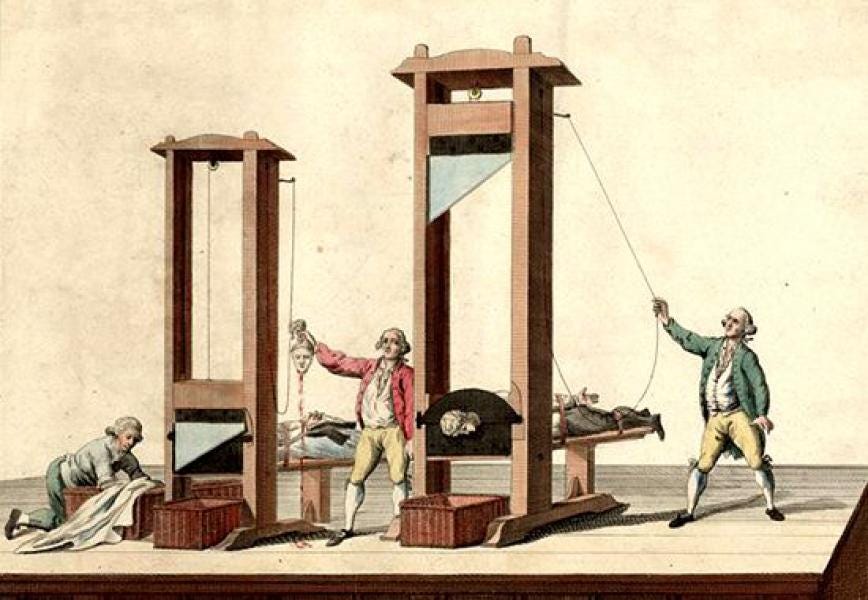
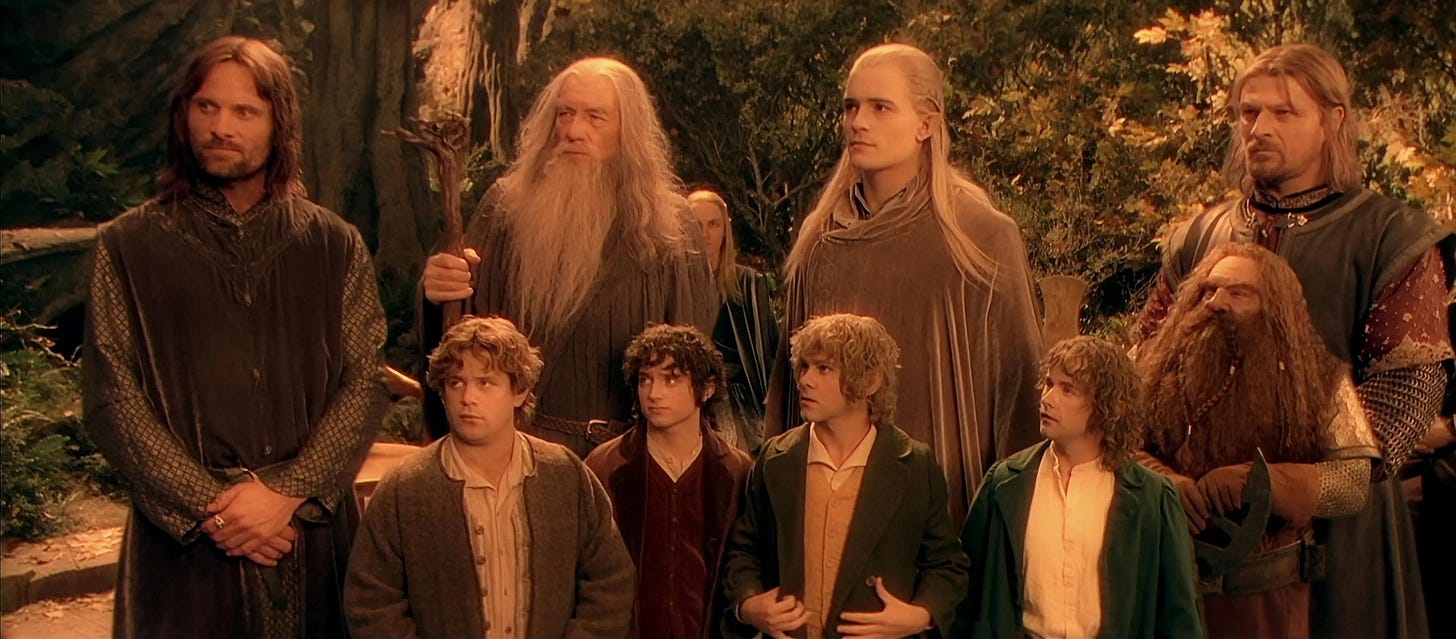
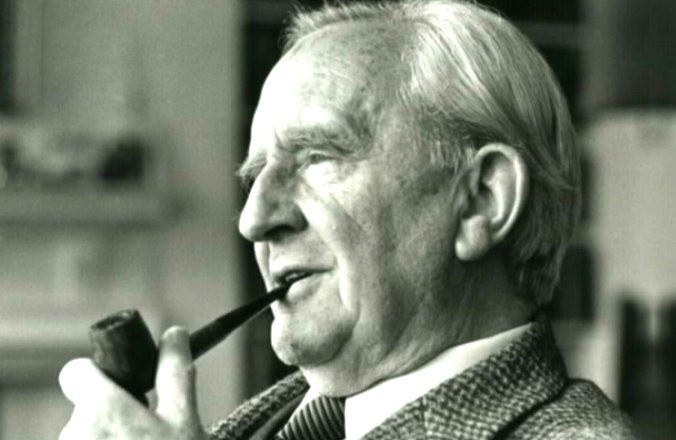
They aren't very complex in the end. So suppose you can't see color. Or lack the capacity to smell. And you are unfathomably arrogant plus lacking in imagination. You are unwilling to give credence to the subjectivity of others. You believe you are special, and superior to others.Therefore, you regard yourself as the arbiter of all that is real.
You will probably regard people marveling over the beauty of colors, or becoming intoxicated with delicious smells, as delusional. You resent their attempts to enjoy art, flowers, perfumes, foods, and even their avoidance of noxious scents and imagery as a false set of choices, that is sometimes imposed on you by inferior, deluded beings.
The NRs cannot see a fair process, or a moral choice, or a cooperative activity that results in widespread agreement as voluntarily embraced, for reasons. All the reasons of others are opaque to them as they necessarily exclude their kingship, their specialness, the fact they view all things correctly, in spite of what they fail to perceive. (which is a lot, but most essential is WHY other people are moved by the subjectivity of others).
Of course it seems like a farce. But at its heart the reaction contains a desire to shut everyone up, all those people moved by elements the neorectionary solipsist cannot see--especially our loves. The din we make from our shared loves is so irritating to them.
The mystery of what Sauron wants--a dark, dead world--it's also a world where the things he can't have can't be had by anybody. If you want power, you have to consume everything or the power of someone to have what you can never enjoy will always taunt you. Fill their minds with fear then, and the joy you are deprived of will vanish.
“The strongest, the smartest, the most capable should lead” so the tech bros think. What is strength? What is intelligence? What is capability? This theory fails in its basic assumptions, right here. Strength is a single mom showing up for her child(ren) every day as best she can. Strength is grieving the death of a loved one and deciding to live a good life anyway. Intelligence is a toddler experimenting all day long with everything available to them in their physical environment as their brains develop and they take on more and more complex tasks. Intelligence is knowing to connect meaningfully with all those we love and care about in the period we are in now. Capability is made up of too many kinds of abilities, skills, talents, awarenesses, and kinds of intelligence to detail briefly. Everyone is strong in some important way. Everyone is brilliant given the chance. Everyone is capable of something that matters.